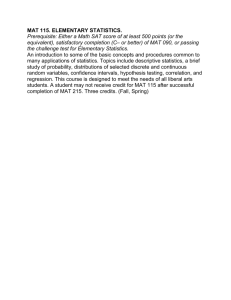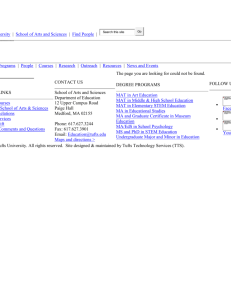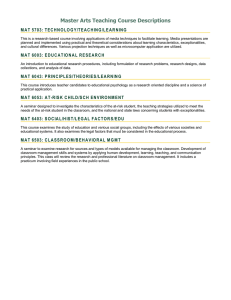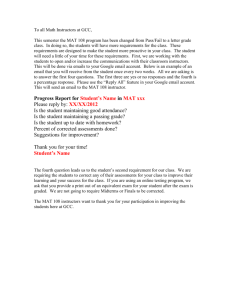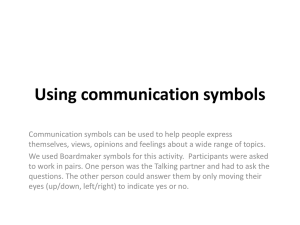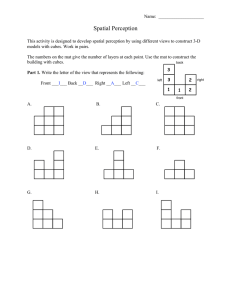Western Carolina University
advertisement
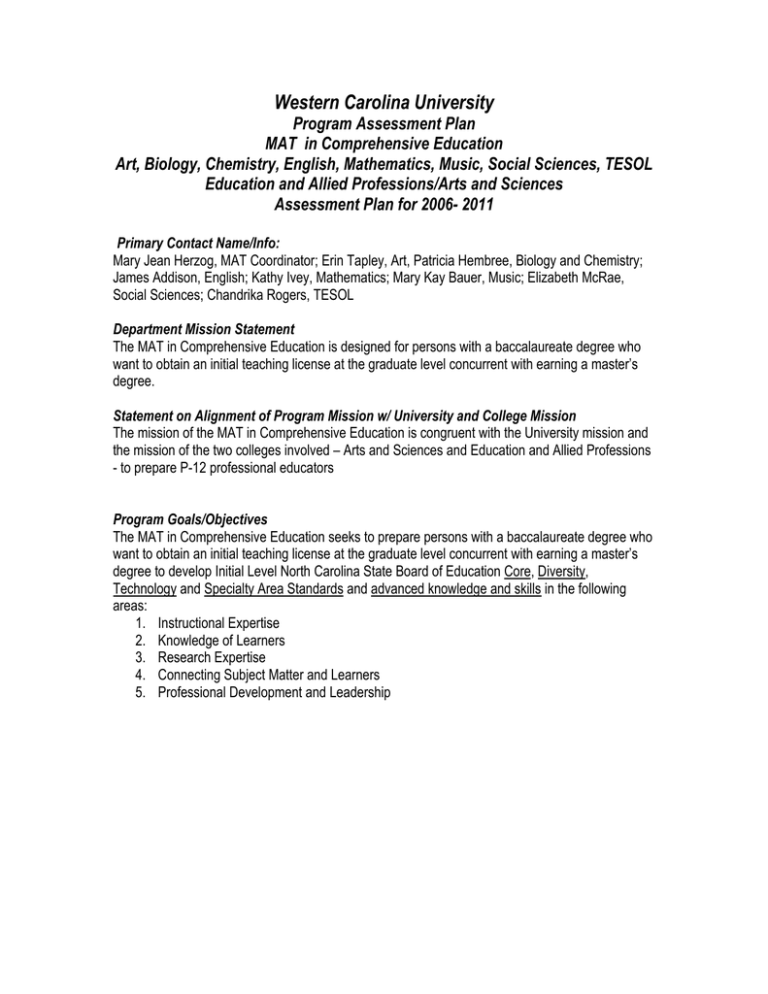
Western Carolina University Program Assessment Plan MAT in Comprehensive Education Art, Biology, Chemistry, English, Mathematics, Music, Social Sciences, TESOL Education and Allied Professions/Arts and Sciences Assessment Plan for 2006- 2011 Primary Contact Name/Info: Mary Jean Herzog, MAT Coordinator; Erin Tapley, Art, Patricia Hembree, Biology and Chemistry; James Addison, English; Kathy Ivey, Mathematics; Mary Kay Bauer, Music; Elizabeth McRae, Social Sciences; Chandrika Rogers, TESOL Department Mission Statement The MAT in Comprehensive Education is designed for persons with a baccalaureate degree who want to obtain an initial teaching license at the graduate level concurrent with earning a master’s degree. Statement on Alignment of Program Mission w/ University and College Mission The mission of the MAT in Comprehensive Education is congruent with the University mission and the mission of the two colleges involved – Arts and Sciences and Education and Allied Professions - to prepare P-12 professional educators Program Goals/Objectives The MAT in Comprehensive Education seeks to prepare persons with a baccalaureate degree who want to obtain an initial teaching license at the graduate level concurrent with earning a master’s degree to develop Initial Level North Carolina State Board of Education Core, Diversity, Technology and Specialty Area Standards and advanced knowledge and skills in the following areas: 1. Instructional Expertise 2. Knowledge of Learners 3. Research Expertise 4. Connecting Subject Matter and Learners 5. Professional Development and Leadership Intended Learning Outcome What will students know or be able to do upon completion of the program? Initial Level Standards in Core, Diversity, Technology and Specialty Area Standards Instructional Expertise: Applies the theoretical, philosophical, and research bases for educational practice in elementary, middle, and secondary school classrooms to improve student learning. Plans, implements, and evaluates instruction that is rigorous, coherent, and consistent with a well-developed theoretical and philosophical stance and with best practices emerging from educational research. Curricular and/or CoCurricular Experiences Where will students acquire the skills and/or knowledge identified in the outcome? Students will acquire the skills and knowledge throughout the MAT in Comprehensive curriculum as stated in the current catalog. Method(s) of Assessment How will you determine that the students know or can do what you expect? Students will submit the MAEd/MAT Comprehensive Portfolio to his/her advisor as a graduation requirement. The MAEd/MAT Comprehensive Portfolio must demonstrate the program objectives and intended learning outcomes. At least two faculty members must evaluate the portfolio according to an attached rubric. The program coordinator will collect evaluations and keep a record. The Director of Field Experiences will supply the evaluation from the Beginning Teacher Assessment System and the Addendum of Advanced Competencies from the required internship. Knowledge of Learners: Incorporates knowledge of the nature of the learner, learning processes, variations in learning abilities and learning styles, and strategies for evaluating learning. Plans, implements, and evaluates instruction that is responsive to wide variations in students' learning needs and learning styles. Annually, the program coordinator will share results of portfolio evaluations for that year with the MAT advisory group chaired by the MAT coordinator to analyze results. If no portfolios were evaluated that year, no report for that program is required. The MAT advisory group is composed of the MAT coordinator, program coordinator from each program, and others as needed. Research Expertise: Understands and employs methods of research to examine and improve instructional effectiveness and student achievement. The MAT advisory group will prepare one MAT assessment report with a section for each separate program. The MAT coordinator is responsible for the overall report and program coordinators are responsible for their own sections. Connecting Subject Matter and Learners: Understands and links subject matter and students' developmental and diverse needs in the context of school settings. Plans, implements, and evaluates instruction that reflects intellectual rigor and depth of knowledge in both subject matter disciplines and students' diverse learning needs. Professional Development and Leadership: Demonstrates self-directed, selfreflective professional behavior and provides leadership to colleagues and communities through collaboration. Due May 31, 2006
